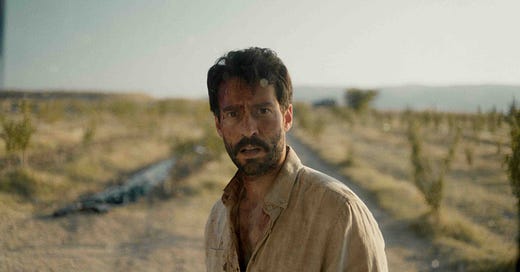SIFF #4: The Things You Kill (Alireza Khatami, 2025)
Last year, Mohammad Rasoulof’s The Seed of the Sacred Fig pushed the limits of Iranian censorship. With its documentary footage of the Woman, Life, Freedom movement and The Shining-inflected genre elements, Sacred Fig not only broke from the West’s understanding of what Iranian cinema could be, but also demonstrated that this type of politically inflammatory filmmaking had direct consequences. Rasoulof was sentenced to flogging and 8 years in prison after Sacred Fig’s announcement as part of the 2024 Cannes Competition lineup, a sentence he narrowly avoided by fleeing the country.
Fellow Iranian director Alireza Khatami, whose Kiarostami-inflected SIFF 50 selection Terrestrial Verses also pushed the boundaries of political expression, has seemingly taken the hint. His latest, The Things You Kill, is a full-on psychological thriller, complete with gruesome violence, surreal doublings, and even multiple sex scenes. The only catch: Khatami, whose script was censored by Iranian authorities, was forced to produce The Things You Kill in Turkey, and the transposition of the baldly autobiographical script is a wound that bleeds through the film’s text.
Said text illustrates a somewhat conventional, if impeccably directed response to Iranian patriarchy. Ali, a middle-aged university professor specializing in translation, is struggling with his masculinity. Outside of class, Ali is caring for his ailing mother, a task complicated by his antagonistic relationship with his domineering father, Hamit. Hamit governs the family with an iron fist, mercilessly berating Ali while covertly beating his mother and sisters. Ali’s impotence in taking care of his mother translates rather directly to his marriage with the veterinarian, Hazar. The two have been struggling to conceive, and Ali has been hiding that it’s because of his low sperm count. In a vague attempt to prove his machismo, Ali is struggling to cultivate a garden in the Turkish countryside. It’s there that he befriends the mysterious Reza, whom he enlists as a hired hand.
All of this sets the stage for a dramatic mental breakdown. The first shoe drops when Ali’s mother dies from a fall and he immediately suspects Hamit, and the second when Khatami belatedly reveals an act of violent retribution. In retrospect, the surreal turn that defines The Things You Kill’s second act was foreshadowed by Khatami’s formal artifice, which depicts domestic drama as modernist proscenium with its intersecting rectangular frames, hip-height camera positioning, and two-shot conversations. As Reza swaps places with Ali and the two wrestle for control, what occurs is an unleashing of primal, subliminal urges. The representation of Ali’s suppressed masculinity, Reza is rugged, brazen, and destructive. In handheld sequences, we watch as “Reza” bribes government officials, masterminds the pair’s revenge against Hamit, and even makes an advance on one of his students.
The Things You Kill’s psychoanalytic deconstruction of its director (note that the composite of Ali and Reza is Khatami’s first name) and its function as a metaphor for its own creation (Ali makes repeated reference to the fact that the Arabic root for the word “translation” means “to kill”, telling his students that “the text is the scene of the crime”) are wholly unprecedented. It’s not just that Khatami has made a fascinating blend of genre and art cinema, it’s Khatami’s infusion of such a tortured, personal perspective within this specific vein of art cinema, traditionally associated with philosophical remove or meta-cinematic layering, that’s so disorienting. That latent sense of autobiographical exorcism powerfully shades The Things You Kill’s fluctuating dreamscape, and by the film’s conclusion, I found it fairly devastating.
The Things You Kill plays on 5/23 and 5/24 as part of the Seattle International Film Festival. Tickets are available here.




